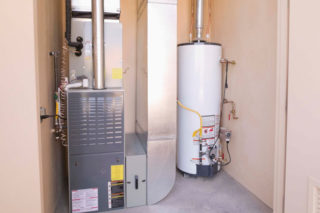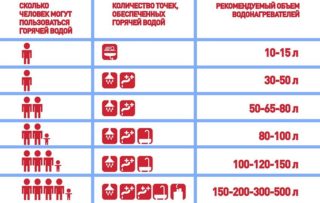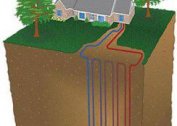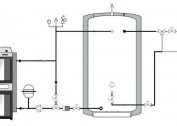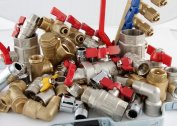Storage boiler is a tank that is designed to heat water. The device is equipped with an internal or external heater. Modifications with an internal heater suggest the presence of a serpentine heat exchanger for the entire length of the tank. For the operation of external heaters, various types of fuel are used - firewood, coal, gas, etc. The accumulative heater distributes water in layers - the hottest is always at the top, the intake is carried out from there.
Types of water storage heater by energy source
According to the source of thermal energy, storage heaters are divided into electric and gas.
Electric storage boiler
It is recommended to purchase for people who consume large volumes of hot water daily, but there is no possibility to use instantaneous water heaters.
The main advantages of such structures include:
- the ability to use water in several places at the same time;
- reasonable cost;
- large volumes of hot water are always available;
- low energy costs (from 1 to 3.5 kW, depending on the power of the equipment);
- Various mounting methods are available.
The disadvantages include:
- take up a lot of space;
- the equipment is characterized by rather complicated and frequent maintenance;
- short operational period - 10-15 years;
When storing water, the heat losses of electric heaters reach approximately 15%, which entails a high energy consumption for heating.
Gas storage heaters
Gas storage boilers are divided into models with forced and natural draft. The former are equipped with a closed combustion chamber, and the latter are open.
The advantages of the equipment include:
- the ability to have several points of water intake, for example, in the bathroom and kitchen;
- simplicity of operation;
- reasonable cost.
The main disadvantages:
- high cost (electrical analogues of the same volume are 2-3 times cheaper);
- fire and explosion hazard under certain conditions of use;
- takes up a lot of space;
- until all the water reaches a predetermined temperature regime, it will take a long time;
- limited installation options.
If we compare the types of boilers by energy source, it is better to give preference to electric, despite the fact that their use is more expensive.
Types of boilers by type of heating and water movement
According to the type of movement of water and heating, boilers are divided into flow and storage.
Flowing electric heaters
Equipped with one or two heating elements. The advantages of this technology include:
- savings are achieved due to the fact that there is no need for the tank to maintain a given temperature regime;
- compact sizes;
- low operational costs;
- the ability to instantly use hot water;
- great possibilities for adjusting the temperature regime.
The disadvantages include:
- high power consumption, which ranges from 5-15 kW;
- for uninterrupted operation requires a constant strong pressure of water;
- the high cost of the equipment itself;
Before buying, it is important to consider the limited throughput of flow heaters.Do not use water in several places at the same time.
Storage heater
This design is based on a magnesium anode, a temperature regulator, and a heating element. The first protects the structure from the negative effects on metals corrosion. Tank volumes range from 15 to 1,500 liters.
Electric storage heaters are predominantly attached to the wall, but there are also floor models with a large volume of capacities.
The device of the electric storage boiler
The design of the water heater includes the following segments:
- magnesium anode;
- outer casing - casing;
- TEN - heater;
- thermal insulation layer;
- a nozzle for the exit of heated water;
- storage tank of the boiler;
- pipe for cold water inlet with a divider of its internal part.
Depending on the modification, the equipment may be equipped with additional elements.
Criterias of choice
When choosing a storage boiler, it is recommended to pay attention to the following criteria:
- The material of manufacture. The most common are stainless steel and enamel. Enameled equipment has a more affordable cost, but their operational life is shorter.
- Guarantee. If the trading company does not provide a warranty card, it is better to refrain from buying at this place.
- Power. This criterion determines how much water will be heated and for how long. When choosing, it is worth analyzing the state of the wiring in the room.
- The presence of a closed / remote temperature controller.
- The volume of the tank should be calculated depending on the amount of fluid consumed daily and the number of water intake points. The most optimal tank volume for a family of 4 people is 80 liters.
- The presence of temperature indicators.
- Types and number of installed tens.
- The presence of additional functionality: anode wear indication, ECO mode, operating time control, SMART, TURBO function.
- Safety and protection against legionella, corrosion, power surges and overheating.
The instruction manual for water heaters is attached to each device.
It is recommended to purchase household appliances from official manufacturers of water heaters or large chain stores, which can provide all the necessary quality certificates, a warranty card for free repair and maintenance.

